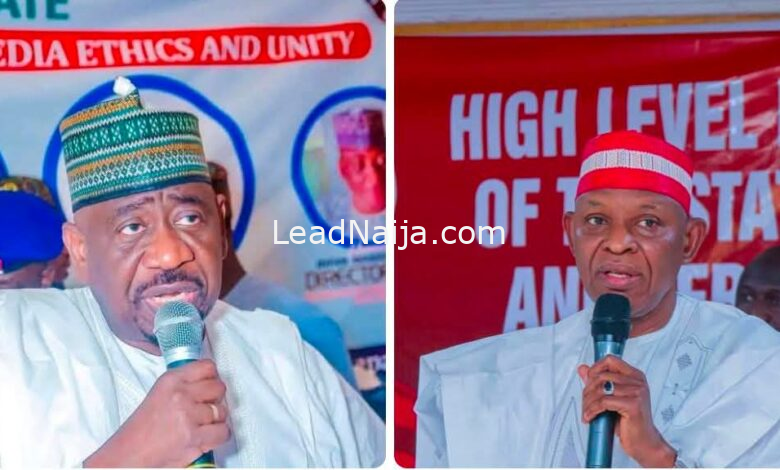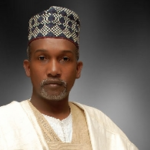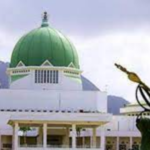The political landscape in Kano State has become increasingly volatile as the ruling New Nigeria People’s Party (NNPP) and the opposition All Progressives Congress (APC) engage in a heated exchange of accusations and inflammatory rhetoric.
In a widely circulated video, Abdullahi Abbas, the APC Kano State Chairman launched a scathing attack on Governor Abba Kabir Yusuf, accusing him of incompetence in managing the state’s affairs.
Abbas attack escalated tensions further by making derogatory remarks, referring to the governor as an ‘effeminate man’ (“Dan-daudu” in Hausa), implying femininity and likening him to a female prostitute.
“In my political understanding, I don’t think people will vote for them again because they have disappointed Kano people. “I have always said it, don’t vote for him; he cannot deliver. He is a woman; he is an effeminate man.” Abbas said.
In a swift response by the NNPP, the Senior Special Assistant to the Governor on Information, Alhajiji Nagoda condemned Abbas’s remarks and countered the accusations of homosexuality.
“No irresponsible man in Kano State can turn our male children into females. No one can insult our governor and expect us to remain silent,” the governor’s aide declared in a video clip circulating on social media.
Adding to the escalating conflict, the Chairman of Gwale Local Government Area, Abdullahi Mu’azu Mojo lashed out at the opposition in another viral video. “If we respond to the opposition, they will not dare insult us again. There are people among them whom we respect. Previously, I said they are using pampers, i only hinted at it but they are homosexuals,” Mojo alleged.
Mojo, who also serves as the Financial Secretary of the Kano State chapter of the Association of Local Governments of Nigeria (ALGON), issued a stern warning to the opposition APC.
“They should stop attacking Governor Abba Yusuf personally. Criticize policies if you must, but don’t cross the line into personal insults,” he cautioned.
Kano Times reports that the exchange of inflammatory remarks has sparked mixed reactions from Kano residents and political observers with many expressing concern that such rhetoric could deepen political divisions and hinder constructive governance in the state.
Commenting on the issue, Dr. Isah Nasidi of the Department of Mass Communication at Baze University, Abuja, described inflammatory speech in politics as a complex and often misused concept.
He explained that, “The first issue to consider when discussing inflammatory speech in politics is its definition, as it is a relative term that has been weaponized by some actors to silence constructive criticism. During Nigeria’s pre-colonial and military eras, nationalists, activists, and opposition party members, such as those from NEPU, were harassed, tortured, and jailed for expressing opinions that irritated incumbent leaders. A recent example is the case of Hamdiyya Sidi Sharif from Sokoto, where politicians exploited the concept of ‘inciting speech’ to suppress dissenting voices.”
Dr. Nasidi highlighted the unhealthiness of some political speeches in Kano, noting that politicians often exceed their fundamental right to free expression by making provocative statements that could incite violence.
“The positive side of this unfortunate culture is that these politicians are well known, which makes addressing the issue easier. However, they often appear ‘too big’ to be held accountable due to the weak rule of law in Nigeria,” he said.
He further emphasized the role of inflammatory speech in fueling political violence. “These actors have used inflammatory rhetoric during elections to recruit thugs and destabilize peace in Kano, yet they face no consequences, this is impunity at its worst. You can find them across all political parties.”
Dr. Nasidi also stressed the importance of factual and constructive political criticism, describing it as the opposite of inflammatory speech. “Accusations based on facts are the foundation of healthy political campaigns when done wisely. It is normal for opposition politicians to highlight flaws, mistakes, and corruption in governance. While it may hurt the incumbent government, it ultimately promotes accountability and good governance.”
Reflecting on Kano’s political dynamics, he noted that, “This is what happened in the 2023 elections. The APC government ignored public grievances, especially regarding corruption and mismanagement. The NNPP capitalized on these shortcomings and won the election. In essence, political accusations and counter accusations are necessary, provided they are factual.”
Dr. Nasidi also lamented the diminishing influence of conventional journalism and regulatory bodies like the National Broadcasting Commission (NBC) in curbing illegitimate speech. He attributed this decline to political interference and the rise of social media.
“Another undeniable factor is that audiences are drawn to sensational content, which tends to go viral more than substantive, productive discussions,” he added.
As Kano’s political climate remains charged, observers urge political actors to focus on policy-driven debates rather than personal attacks to ensure stability and progress in the state.



